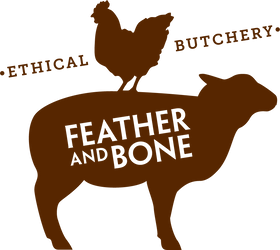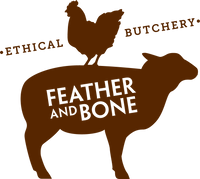Will the real ‘FREE RANGE’ produce please stand up??!
You may have noticed that we've changed our masthead a bit - we've exchanged 'Free Range Providore' for 'Pastured Produce' on the logo and simplified our blurb. Here's why....
Will the real ‘FREE RANGE’ produce please stand up??!
Or go for a run, or have a dust bath, or dig up some roots, or roll in the dirt, or flap it’s wings, or chase it’s siblings, or forage for insects, or lie in the sun, or go for a belt in the rain, or get up and go to bed with the sun, or regularly graze on fresh grasses, or have a mud bath, or have enough room to safely sort out social hierarchies, or even go off on it’s own for a while if it’s having a bad day.
These are activities only animals that are truly free to range on fresh pasture for the majority of their lives can enjoy. We think this is what most people understand by the term ‘Free Range’.
The trouble is, in Australia at the moment, the term 'Free Range' can legally be attached to an egg from a 40,000 chickens per hectare farm (0.25 square metre per bird) and an egg from a farm like Farmer Brown where the stocking density is 15 chooks per hectare. 'Free Range' is also the label used in marketing pork from pigs that have only lived on pasture for three weeks before being moved into sheds for the remainder of their lives. A level playing field? More like no playing field at all.
Animals living mostly, or totally, in sheds can’t do any of the things we've described above. Nor can they do much of this stuff if the outside area to which they have access is too small to cope with the numbers of animals using it.
Most animals graze throughout the day so, if an animal sleeps in a shed and if their food and water is in that shed then they’re less likely to choose to go outside. If they do spend a lot of time outside – for example, if they’re locked in a shed at night and taken outside during the day – then it’s critical that the stocking density (the number of animals per hectare) is appropriate for the particular animals and the land. If it’s too high, there won’t be sufficient room for the animals to do their thing and they’ll damage the land.
The Egg Corp is proposing to alter the definition of Free Range Eggs for retail to allow farms to run 20,000 chooks per hectare. This is 0.5 square metres per bird. In NSW, the proposed standard that has already passed the Upper House and needs to be passed through the Lower House to become law is 1,500 birds per hectare (6.6 metres per square metre) which is still quite a lot if the birds aren't being rotated to new pasture regularly.
Putting aside the behavioural impacts of increasing the standard to 20,000 (not much wing-flapping or running possible when you’ve only got 0.5 square metres of space), the amount of chook manure produced by 20,000 chooks would poison any vegetation so there wouldn’t be much grazing or insect hunting going on. The topsoil wouldn’t be able to absorb the volume of chook manure from 20,000 chooks (app 1 tonne per day) so it would need to be removed and disposed of separately.
Rotating the chooks onto fresh pasture daily would alleviate this, but pasture takes a while to recover from over-stocking so you need plenty of available land. The Egg Corporation’s proposal makes no mention of rotating the chickens onto fresh pastures. In fact, to our knowledge, environmental impact issues are not even part of the terms of reference for either the Government Working Party that is considering the Egg Corporation's proposal nor the ACCC which is inviting public submissions in response to the proposal. (Submissions to the ACCC close on 20 June and we'd strongly encourage you to have your say. There's a good guide on the Humane Choice site listed at the end of this piece.)
The thing about farming is that everything is interconnected. In affluent Western societies this is easy to forget because we're largely dissociated from the sources of our food. But the health and vitality of animals living outside (which is what Free Range implies) is fundamentally connected to the health and vitality of land on which they live. If the soil isn’t in good shape, then it won’t withstand the extremes of our climate or yield nutritious, plentiful vegetation. This is why many sheep, cattle, chicken and pig farmers describe themselves as grass farmers, to borrow a term commonly used by Joel Salatin.
Clearly, what the Egg Corporation considers 'Free Range' is very different to our definition. Without a national, legislated standard, the market is left to it's own devices which can be both marvellously ingenious and devlishly corrupt and you can be pretty sure that consumer or animal welfare won't be the primary concern. Suffice to say, there is much more 'Free Range' produce available on retail shelves than could ever be produced on the genuine free range farms in Australia.
Of course, quality of life and environmental impact are the main issues here but, frankly, nothing compares to the clean flavour and texture of an animal that’s lived an energetic, low-stress life outside on sustainably-managed pastures.
Irrespective of the outcome of the Egg Corporation proposal, we’ve come to the conclusion that, in the absence of a national, legislated definition and certification process, the term ‘Free Range’ has become relatively meaningless. It’s used with increasing frequency and decreasing transparency and has ceased to provide the consumer with an assurance about how a farm is managed or how the animals are raised. After all, as the Egg Corporation admits, there are farms housing 40,000 chooks in sheds selling their eggs as ‘Free Range’.
Consequently, we’ve decided that the term ‘Pasture-raised’ is a much better descriptor for the produce we source and sell and the farms we represent. A 'pastured' animal raised on sustainably-managed pasture for the majority of its life is also, by definition, a free ranging animal.
With the exception of Isola Chianina from Victoria and other cattle farmed alongside them, all our producers are within NSW and we visit every farm from which we source to validate all claims and to learn as much as possible about the farms. All the produce we sell comes from farms practicing regenerative, sustainable land management with no or absolutely minimal chemical intervention. All the ruminants are grass fed and finished (with the exception of Nantucket Farm where the animals are offered whole grains and sprouted grain as part of the menu from which they can choose - or not). All farms run low stocking densities and rotational practices and all animals range freely on pasture for the majority of their lives. No animals are administered hormones or prophylactic antibiotics. We and the farmers we represent welcome all questions about what we do.
So, from now on, Feather and Bone are specialists in ‘pastured produce’.
Yours in pasture,
Laura and Grant
Sites you might find interesting.
Will the real ‘FREE RANGE’ produce please stand up??!
Or go for a run, or have a dust bath, or dig up some roots, or roll in the dirt, or flap it’s wings, or chase it’s siblings, or forage for insects, or lie in the sun, or go for a belt in the rain, or get up and go to bed with the sun, or regularly graze on fresh grasses, or have a mud bath, or have enough room to safely sort out social hierarchies, or even go off on it’s own for a while if it’s having a bad day.
These are activities only animals that are truly free to range on fresh pasture for the majority of their lives can enjoy. We think this is what most people understand by the term ‘Free Range’.
The trouble is, in Australia at the moment, the term 'Free Range' can legally be attached to an egg from a 40,000 chickens per hectare farm (0.25 square metre per bird) and an egg from a farm like Farmer Brown where the stocking density is 15 chooks per hectare. 'Free Range' is also the label used in marketing pork from pigs that have only lived on pasture for three weeks before being moved into sheds for the remainder of their lives. A level playing field? More like no playing field at all.
Animals living mostly, or totally, in sheds can’t do any of the things we've described above. Nor can they do much of this stuff if the outside area to which they have access is too small to cope with the numbers of animals using it.
Most animals graze throughout the day so, if an animal sleeps in a shed and if their food and water is in that shed then they’re less likely to choose to go outside. If they do spend a lot of time outside – for example, if they’re locked in a shed at night and taken outside during the day – then it’s critical that the stocking density (the number of animals per hectare) is appropriate for the particular animals and the land. If it’s too high, there won’t be sufficient room for the animals to do their thing and they’ll damage the land.
The Egg Corp is proposing to alter the definition of Free Range Eggs for retail to allow farms to run 20,000 chooks per hectare. This is 0.5 square metres per bird. In NSW, the proposed standard that has already passed the Upper House and needs to be passed through the Lower House to become law is 1,500 birds per hectare (6.6 metres per square metre) which is still quite a lot if the birds aren't being rotated to new pasture regularly.
Putting aside the behavioural impacts of increasing the standard to 20,000 (not much wing-flapping or running possible when you’ve only got 0.5 square metres of space), the amount of chook manure produced by 20,000 chooks would poison any vegetation so there wouldn’t be much grazing or insect hunting going on. The topsoil wouldn’t be able to absorb the volume of chook manure from 20,000 chooks (app 1 tonne per day) so it would need to be removed and disposed of separately.
Rotating the chooks onto fresh pasture daily would alleviate this, but pasture takes a while to recover from over-stocking so you need plenty of available land. The Egg Corporation’s proposal makes no mention of rotating the chickens onto fresh pastures. In fact, to our knowledge, environmental impact issues are not even part of the terms of reference for either the Government Working Party that is considering the Egg Corporation's proposal nor the ACCC which is inviting public submissions in response to the proposal. (Submissions to the ACCC close on 20 June and we'd strongly encourage you to have your say. There's a good guide on the Humane Choice site listed at the end of this piece.)
The thing about farming is that everything is interconnected. In affluent Western societies this is easy to forget because we're largely dissociated from the sources of our food. But the health and vitality of animals living outside (which is what Free Range implies) is fundamentally connected to the health and vitality of land on which they live. If the soil isn’t in good shape, then it won’t withstand the extremes of our climate or yield nutritious, plentiful vegetation. This is why many sheep, cattle, chicken and pig farmers describe themselves as grass farmers, to borrow a term commonly used by Joel Salatin.
Clearly, what the Egg Corporation considers 'Free Range' is very different to our definition. Without a national, legislated standard, the market is left to it's own devices which can be both marvellously ingenious and devlishly corrupt and you can be pretty sure that consumer or animal welfare won't be the primary concern. Suffice to say, there is much more 'Free Range' produce available on retail shelves than could ever be produced on the genuine free range farms in Australia.
Of course, quality of life and environmental impact are the main issues here but, frankly, nothing compares to the clean flavour and texture of an animal that’s lived an energetic, low-stress life outside on sustainably-managed pastures.
Irrespective of the outcome of the Egg Corporation proposal, we’ve come to the conclusion that, in the absence of a national, legislated definition and certification process, the term ‘Free Range’ has become relatively meaningless. It’s used with increasing frequency and decreasing transparency and has ceased to provide the consumer with an assurance about how a farm is managed or how the animals are raised. After all, as the Egg Corporation admits, there are farms housing 40,000 chooks in sheds selling their eggs as ‘Free Range’.
Consequently, we’ve decided that the term ‘Pasture-raised’ is a much better descriptor for the produce we source and sell and the farms we represent. A 'pastured' animal raised on sustainably-managed pasture for the majority of its life is also, by definition, a free ranging animal.
With the exception of Isola Chianina from Victoria and other cattle farmed alongside them, all our producers are within NSW and we visit every farm from which we source to validate all claims and to learn as much as possible about the farms. All the produce we sell comes from farms practicing regenerative, sustainable land management with no or absolutely minimal chemical intervention. All the ruminants are grass fed and finished (with the exception of Nantucket Farm where the animals are offered whole grains and sprouted grain as part of the menu from which they can choose - or not). All farms run low stocking densities and rotational practices and all animals range freely on pasture for the majority of their lives. No animals are administered hormones or prophylactic antibiotics. We and the farmers we represent welcome all questions about what we do.
So, from now on, Feather and Bone are specialists in ‘pastured produce’.
Yours in pasture,
Laura and Grant
Sites you might find interesting.




Leave a comment